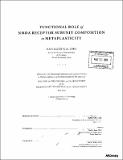Functional role of NMDA receptor subunit composition in metaplasticity
Author(s)
Cho, Kathleen K. A. (Kathleen Kyung-Ah)
DownloadFull printable version (16.16Mb)
Other Contributors
Massachusetts Institute of Technology. Dept. of Brain and Cognitive Sciences.
Advisor
Mark F. Bear.
Terms of use
Metadata
Show full item recordAbstract
Modification of synapses by neural activity has been proposed to be the substrate for experience-dependent brain development, learning, and recovery of function after brain damage. In the visual cortex, the strength of cortical synapses can be bidiredionally modified, where in response to a critical level of postsynaptic activation, synapses are strengthened (long-term potentiation; LTP) and below this level, synapses are weakened (long-term depression; LTD). Previous work in visual cortex has suggested that the threshold for synaptic modifications is dependent on the recent history of visual experience, a phenomenon called metaplaticity. Recent mechanistic studies have shown that experience-dependent adjustments of the modification threshold correlate with changes in the subunit composition and function of NMDA-type glutamate receptors (NMDARs). However, causality has not been conclusively established. Here we examined the mechanistic basis of metaplaticity, and specifically how this process is mediated by a switch in NMDAR subunit composition by focusing on the NR2A subunit of the NMDA receptor in visual cortex. We provide evidence for the functional significance of the NR2A subunit in metaplastic changes both in synaptic platicity elicited in vitro and in naturally-occurring platicity in vivo. We also performed a comparison of in vitro methods of inducing plasticity and those which subserve in vivo experience-dependent changes in synaptic strength. These findings represent an important step forward in understanding how plasticity thresholds are regulated in the brain.
Description
Thesis (Ph. D.)--Massachusetts Institute of Technology, Dept. of Brain and Cognitive Sciences, 2009. "June 2009." Includes bibliographical references (leaves 127-150).
Date issued
2009Department
Massachusetts Institute of Technology. Department of Brain and Cognitive SciencesPublisher
Massachusetts Institute of Technology
Keywords
Brain and Cognitive Sciences.